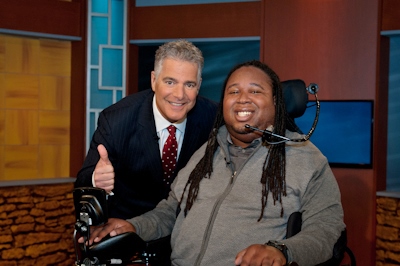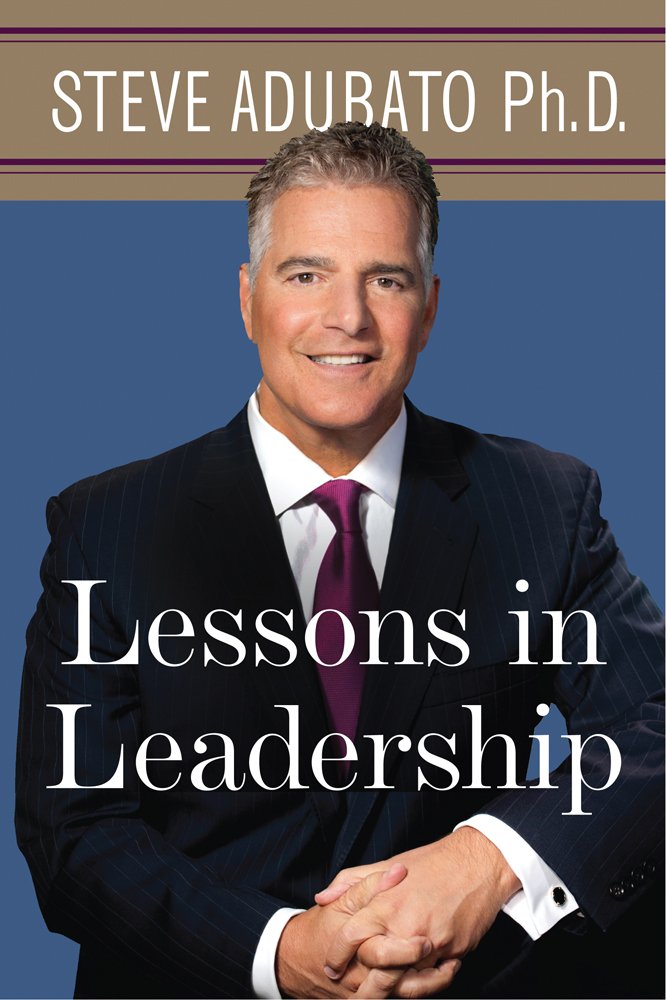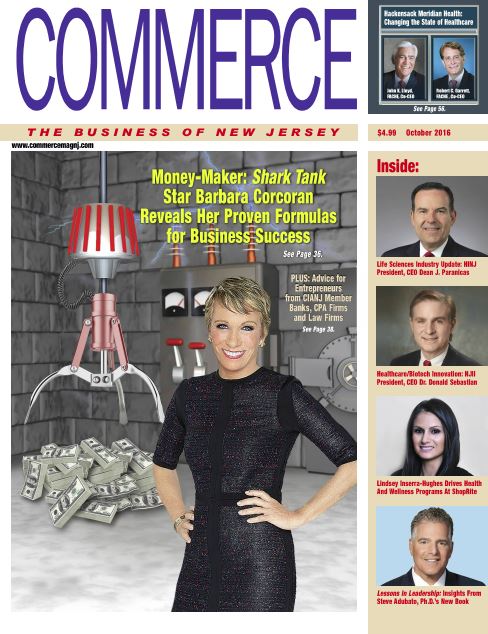Lessons in Leadership Reveals How Great Leaders are Forged by Life’s Experiences
by: Miles Z. Epstein for COMMERCE Magazine
Just as iron needs to be heated up and hammered into shape, great leaders are formed by real-life challenges that test their mettle. To be tough enough to lead means you must be willing to learn from both your mentors and your mistakes. These are two key takeaways from Lessons in Leadership (Rutgers University Press), a new book by Steve Adubato, Ph.D., an Emmy Award winning television broadcaster, author, motivational speaker, leadership and communication coach, syndicated columnist and university lecturer.
“There are some people who may have some natural born leadership ability, but to really become an exceptional leader, you’ve got to make mistakes and learn from them,” explains Adubato in an interview with COMMERCE. “You’ve got to have mentors and get knocked around in the real world through very difficult experiences. I’m not convinced that there are born leaders, but rather individuals that make a decision to work at being the best leaders and see every experience as an opportunity to grow."
Here are Dr. Adubato’s thoughts on leadership, the metrics that can be used to evaluate leaders and how to improve these skills in those that have or will have responsibility for others.
COMMERCE: Based on your research for Lessons in Leadership, what qualities should an effective leader possess?
STEVE ADUBATO: One of the most important qualities for a great leader is to be self-aware of his or her strengths as well as opportunities to improve. Great leaders know themselves, but also are constantly looking for candid feedback from others. They don’t get defensive when they hear something that isn’t complimentary, because they are always looking to get better. Further, the best leaders are always concerned about developing the leaders around them instead of simply just trying to be the boss.

Q. What event or interview has taught you the most about being a leader?
A. I’ve been blessed to have interviewed hundreds of extraordinary leaders, so it is hard to say that one interview has taught me the most about leadership. However, a constant theme is that leadership is largely about overcoming obstacles by always seeing opportunities where others see barriers. When you interview someone like former Rutgers University football star Eric LeGrand—who was paralyzed several years back in a football game and today continues to inspire others with his positive attitude—you realize that the truly great leaders know that it is rarely what happens to you that dictates your outcome, but rather how you choose to deal with it.
Q. Can you name and explain your picks for the best leaders based on the criteria you developed in your book?
A. There are so many great leaders that are featured in Lessons in Leadership, but one who really stood out for me is timeless, and that is Abraham Lincoln. He was not a charismatic communicator, but he had a unique ability to surround himself with his “rivals” who politically were not in his corner. In fact, many hated him and wanted him to fail. Yet, Lincoln knew that by pulling them closer, and getting their input, he would become a stronger leader and the country would be better off. That takes great humility, confidence and security.
Q. Can you please discuss a few “leaders” who disappointed you, didn’t live up to expectations or were not up for a challenge when they faced it? What can we learn from their mistakes?
A. One is the captain of the Costa Concordia, who abandoned his ship when he knew it was about to go down because of his reckless behavior. Captain Francesco Schettino was only looking out for himself and, in the process, 32 people died. Real leadership knows that what matters most is how you deal with tremendous adversity, the need to stay calm and composed and to look out for those around you, instead of jumping ship and simply saving yourself.
Q. What are some of the self-assessment tools for people to gauge their own leadership skills—or those of others—discussed in your book?
A. My favorite assessment tool is a 360 degree performance survey where a leader asks the three or four closest people to him to answer two questions. What are my three greatest strengths as a leader? What three areas specifically do I need to improve in, and why? Sounds simple, but every time I’ve done this in my executive coaching, the feedback leaders receive is powerful.
Q. Donald Trump has been public about never apologizing for anything, even though he has used the word “regret” just recently. What role does saying, “I’m sorry” play in the character of a leader?
A. Great leaders give credit and take the blame. Whether it is Donald Trump, Hillary Clinton or any major public figure who has a hard time “owning” their mistakes and saying, “I’m sorry,” doing this demonstrates poor leadership. The irony is that many leaders I’ve worked with say apologizing or admitting a mistake is a sign of weakness when the opposite is true. The greatest leaders know that it takes great confidence to admit your mistakes, apologize and then actually do something about it.
 Q. Many leaders—Trump, Clinton and Obama included—don’t handle criticism very well. How important is getting feedback from your team? To what extent does ego get in the way of leadership?
Q. Many leaders—Trump, Clinton and Obama included—don’t handle criticism very well. How important is getting feedback from your team? To what extent does ego get in the way of leadership?
A. In Lessons in Leadership, I talk about President Obama’s leadership style. I respect him for having the toughest leadership job in the world. But there are times that he has taken too long to act or was not proactive enough and, in doing so, he delegated to the point of not being aware of a problem that was going on for a long time, such as with the implementation of the Healthcare.gov Website. Great leaders are engaged, get consistently updated and assert their leadership without micromanaging.
Q. You cover Trenton as a columnist and an Emmy Award-winning broadcaster, worked as a legislator early in your career and know our state legislators personally. How would you assess leadership in New Jersey government? How can we do better serving the needs of the great citizens of the Garden State?
A. As the co-anchor of New Jersey Capitol Report for more than 20 years, and as an observer of our Statehouse, while I respect the legislative and executive branches of government, there has been a lack of leadership in taking on the toughest challenges,be it the Transportation Trust Fund or the pension crisis. They have been too quick to blame each other, without solving problems. Great leadership is never about who gets credit, but rather about moving things forward. Let’s just say that we can always use better leadership under the “Golden Dome,” particularly with New Jersey’s problems mounting every day.
Steve Adubato, Ph.D., currently anchors three public television broadcasts produced by the Caucus Educational Corporation (CEC)— Caucus: New Jersey with Steve Adubato; New Jersey Capitol Report; and One-on-One with Steve Adubato. These series air on the PBS flagship THIRTEEN/WNET, NJTV, WHYY as well as on FiOS. Steve is also the author of four other books: Speak from the Heart, Make the Connection, What Were They Thinking? and You Are the Brand.
